The controversy over the poor choice film of the past several years for the Royal Film Performance came to a head in 1954, with the showing of Beau Brummell, starring Stewart Granger, Elizabeth Taylor, and Peter Ustinov. It portrayed an embarrassing time in Britain's history and the Monarchy. It also alluded more recent Royal scandals and mishaps, with parallels to the Duke of Windsor (King Edward VIII who abdicated in 1936) and Wallis Simpson. This article outlined the uncomfortable moments:
The scene where the "mad King George III" (Robert Morley) tries to strangle his son, the Prince of Wales (Peter Ustinov), was awkwardly, and noticeably, cut from the film.
The Daily Express also wrote, "Why aren't the organizers satisfied with their yearly achievement of boring the Queen with what they choose to show her? Why this year did they decide to embarrass her instead? Fancy giving your patronage at a film show in which you have to watch [...] your ancestors going mad," [etc.].
Another article asked, "What on earth persuaded the organizers to choose this of all films to show the Queen? Why didn't the Queen's advisers point out that it made fun of the Royal line and made the monarchy into a clown's act? Did the Queen go to the theatre last night, not knowing what she was in for?"
Peter Ustinov, whose portrayal as the Prince of Wales/George IV was part of the controversy, had his own idea of why the film was chosen - "because the committee in charge of such events decided that nothing interested royalty more than royalty. It was only when Robert Morley as George III attempted to strangle me - a most realistic performance - that suddenly a hideous doubt sprang up in the minds of those responsible that the sight of one of the Queen's not-too-distant ancestors attempting to strangle another one in a fit of insanity was perhaps not the happiest of diversions for Her Majesty, and the press the next day bubbled with that particular form of pious hypocrisy which has marked all recent British scandals, large or small" (Dear Me, Peter Ustinov, 1977).
The Duke of Edinburgh was also shocked at the choice. The royals understandable left quickly after the film. I would love to know what the Prince Philip's actual words were ;)
It even led to accusations of the Royal patronage being exploited by the movie magnates in order to line their own pockets, as a film that was attended by the Royals earned as much as £50,000 extra.
The Queen is famous for "keeping calm and carrying on" but she had finally had enough. In 2010, recently declassified documents confirmed the 1954 headlines. Winston Churchill's Private Secretary, David Pitblado, wrote in a memo, "The Prime Minister asked me to look into this when he returned from his audience with the Queen. The Queen had told him what a bad film it was and he, on his own initiative, wanted to see what could be done about it for the future." Another memo written by Sir Frank Lee, the Permanent Secretary at the Board of Trade, said, "There is no doubt at all that the quality of the films shown to HM on the last four occasions (which I have also had the misfortune to attend) ranged from the mediocre down to the vulgar and distressing. The whole evening is a long and garish ordeal; it is not surprising that both HM herself and most outside critics should ask whether the selection of the main film to be shown could not be radically improved." You can read the Daily Mail article here.
Suggestions for this improvement were reported in this article:
Producer Alexander Korda, suggested an independent committee that would choose something "more worthy of the occasion which would make the event a more glittering occasion and may be more entertaining for Her Majesty" (source).
There were even rumors of the Queen banning future Royal Film Performances.
It was decided that a someone from outside the movie business would have the final say in the choice of picture. They would also eliminate the stage show and shorten the "meet and greet," so that the length of the evening would be around two hours and forty minutes. This proved to solve the problem, and the Queen was delighted with the choice of film for 1955 (check back next month to see what it was!) and the new shorter format.
Video of Stars and Royals arriving
Jack Hawkins, the narrator, calls Stewart Granger "Jimmy Granger." Granger's real name was James Stewart. He understandably couldn't use that name in pictures ;)
Clips of the shorts and stage show shown before the film
This article describes the gowns in a little more detail.
Jane Russell also recalled what she spoke about with Prince Philip:
Much was made of Peter Finch meeting the Queen:
To see some great photos of the evening, Google "Royal Film Performance 1954" and click on "images."



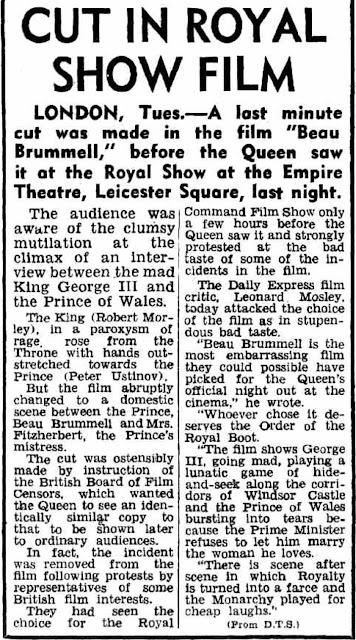






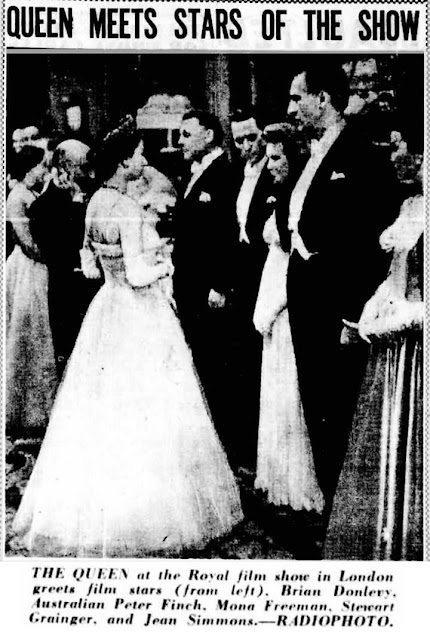

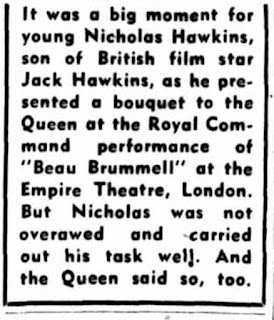
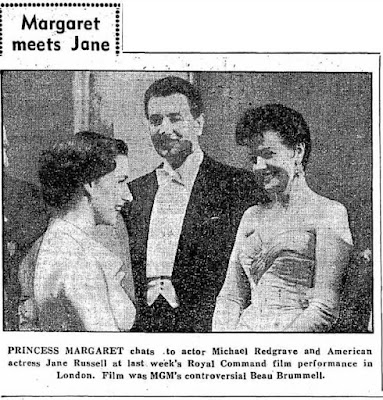




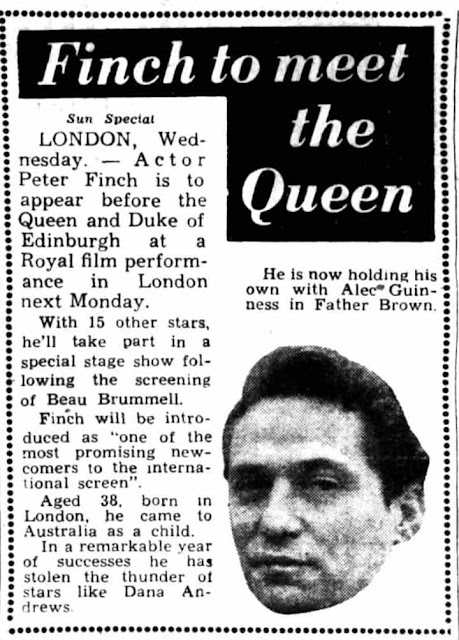


No comments:
Post a Comment